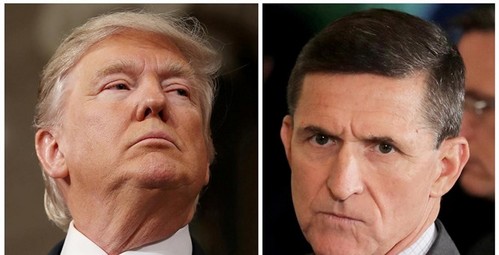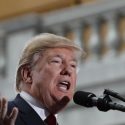The General and the President
This is a tale of FBI power misused and presidential trust misplaced.
Last week, retired Lt. Gen. Michael Flynn, President Donald Trump’s confidant on matters pertaining to national security from June 2015 to February 2017 and his short-lived national security adviser in the White House, pleaded guilty in federal court in Washington, D.C., to a single count of lying to the FBI. Under the terms of his plea agreement, Flynn, who had faced nearly 60 years in federal prison had he been convicted of charges related to all the matters about which there is said to be credible evidence of his guilt, will now face six months.
What could have caused Robert Mueller, the no-nonsense special counsel investigating whether any Americans aided the Russian government in its now well-known interference in the 2016 American presidential election, to have given Flynn such an extraordinary deal?
Here is the back story.
During the FBI’s investigation of Russian meddling in the election, it became interested in Flynn’s communications with Sergey Kislyak, a KGB colonel (the KGB is now known by its post-Soviet acronym, FSB) masquerading as the Russian ambassador to the U.S.
After Trump won the presidency, Flynn became an important member of the presidential transition team. Between the election and the inauguration, Flynn spoke on the telephone with Kislyak five times. Because Kislyak was a foreign spy, as well as an ambassador, his communications with Americans were monitored by the FBI.
When Flynn agreed to be interviewed by the FBI in his West Wing office on Jan. 24, he probably did not know what the agents were looking for. Jim Comey was still the director of the FBI. Mueller had not yet been named special counsel. The FBI investigation into Russian meddling in the just-completed presidential election was in its infancy.
Prior to the interview, the FBI obtained the transcripts of Flynn’s conversations with Kislyak. The conversations themselves were not illegal. On the contrary, it is expected that an incoming presidential administration will begin to reach out to foreign leaders even before the new president is inaugurated.
When the FBI interviewed Flynn, it asked him whether he had spoken with Kislyak and, if so, whether they had discussed American sanctions imposed on Russian individuals as retaliation for Russian meddling in the election. Flynn acknowledged the conversations but denied that they had been about sanctions. The two agents interviewing him knew immediately that he was lying because they had read the transcripts of his conversations.
Since the FBI knew the subject matter of the Flynn-Kislyak conversations, what was the purpose of the Flynn interview? And given that the conversations were lawful — as long as they occurred after Trump’s victory — why would Flynn lie about them? As well, given that Flynn once ran thousands of surveillance projects against high-level foreign targets, how could he not have known that the FBI knew what he had discussed with Kislyak before its agents walked into his office?
Did Flynn have anything to hide from his interrogators? If he did, he has no doubt since revealed it to the FBI, because his guilty plea requires full cooperation with the same special counsel team that prosecuted him.
Timing is everything. The question of whether the conversations occurred while Trump was a candidate and whether they involved the transfer of anything of value from the Russian spy to the American campaign adviser or vice versa — whether the campaign, through Flynn, helped the Russians in their meddling or the Russians gave helpful information to the campaign in exchange for something of value — is at the heart of Mueller’s mission to prove or dispel allegations that the Trump campaign colluded with Russia.

Three weeks after the FBI interviewed Flynn, Trump fired him. The publicly stated reason for the firing was a purported lie that Flynn had told to Vice President Mike Pence about his conversations with Kislyak. Last weekend, on the day after Flynn pleaded guilty, the president issued a tweet claiming that he fired Flynn for lying to Pence and the FBI.
If Flynn was fired in February for lying to the FBI in January, then Trump was aware of Flynn’s lies and his likely prosecution for them when he asked Comey to back off the FBI investigation of Flynn and then fired Comey for not backing off. This is dangerous territory for the president.
Obstruction of justice is the interference with a law enforcement or judicial proceeding for a corrupt purpose. Thus, if the president knew of Flynn’s lies to the FBI when he asked Comey to back off Flynn, the existence of a presidential crime and impeachable offense depends on the president’s state of mind.
If the “back off Flynn” request was given because the president felt sorry for the general or because he had concluded that the FBI’s limited resources would be better utilized finding terrorists or arresting bank robbers, there was no corrupt motive. But if the motive for the request to Comey was fear of what beans Flynn might spill — about the president himself or his son-in-law, for example — that would be a corrupt motive, and the request would be a crime, as well as an impeachable offense.
Obstruction of justice is the rare federal crime that need not succeed to be criminal and prosecutable. It is also the rare federal crime that nearly all legal scholars agree is an impeachable offense. The president’s lawyers are not among them. They have argued that because the president is the chief federal law enforcement officer in the land, his decisions on whom to prosecute are final and always lawful. That sounds like former President Richard Nixon’s now fully discredited argument that “when the president does it, that means that it is not illegal.”
In America, the president is a public servant, not a prince. Is the president in legal hot water? In a word: yes.





